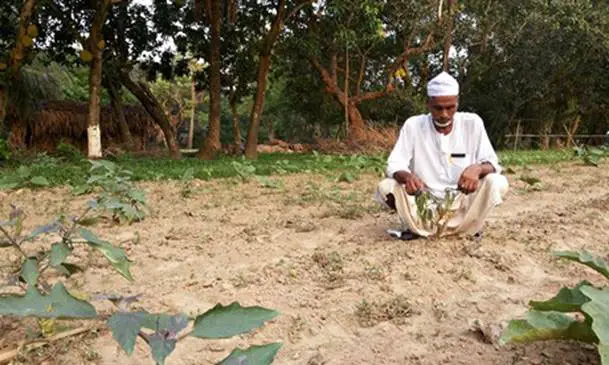A new pilot plan for commercial cultivation of the first GM Bt brinjal (eggplant) crop in Asia has been riddled with problems and has been essentially declared a “failure” according to a recent report by the Institute of Science in Society (ISIS) website, as noted in this article by Dr. Eva Sirinathsinghji.
Disappointing results were recorded for 9 of the 20 farmers testing out the new GM crop according to a report in the Guardian newspaper during the trials, which were conducted in Bangladesh after Indian mass protests cancelled plans for cultivation in that country.
In total, four varieties were planted: named Kajla, Uttara, Nayantara and ISD006, in different regions of the country.
Brinjal is one of the most important Bangladeshi crops for both consumption and export according to the ISIS article, and there are fears that genetically modifying this key crop constitutes a major health and economic risk for the country, which depends on the purity and integrity of brinjal for its markets.
Of particular concern is preserving the region as a center of origin and genetic diversity for brinjal, one that should be protected from genetic contamination as advised under the UN Cartagena Protocol on Biosafety, the article said.
Brinjal and the GMO Takeover
Much like how arguably the biggest and most important crop in the United States (along with wheat), corn, was targeted for “genetic takeover” by Monsanto in the United States, brinjal is now being targeted in Bangladesh, with the likely goal of making inroads into the Indian market long term.
The crop is highly important to the region, and targeting such staple crops in different regions has an effect of allowing GMO companies like Monsanto to gain a major foothold that can be extremely difficult to overcome or even slow down once cultivation becomes more widespread (see this excellent short documentary on GM corn in the Philippines for more, it’s a textbook example).
In India, a moratorium on GM brinjal is now in effect thanks to the efforts of citizens and environmental groups, and similar opposition from 100 civil organizations in Bangladesh has occurred.

Abul Baten, shown here, saw his Bt brinjal crop die prematurely, causing huge financial losses. Other farmers had problems selling at the market due to consumer rejection, or saw their crops wilt later in the growing cycle.
GM Brinjal Failure Recorded
According to the ISIS article, 9 of the 20 farms growing GM brinjal reported major problems including wilt and drought, along with pest infestations, low yields, unwanted produce (locals refused to buy it) and more.
One region, Gazipur, reportedly had a failure rate at 4 out of 5 farms resulting in huge financial losses for farmers.
The field trials were created with the support of USAid and Cornell University, and may not have followed some stipulations of its licensing agreement, raising questions about the plan’s legality.
The stipulations included: proper labeling, safety measures in the field including distance management planning, and techniques for the protection of indigenous varieties and wild plants.
The Bangladesh Agricultural Research Institute (BARI), however, which worked along with the U.S. organizations, admitted it did not visit the fields before planting the crops, and reports have also shown that many people purchasing the GM crops were unaware of what they were actually buying.
This type of Bt brinjal was originally developed by Mahyco, an Indian subsidiary of Monsanto, for use in India, but the technology was transferred to Bangladesh after protests derailed the Indian plans.
For more detailed information on the planned “Bt brinjal takeover” in the region, check out the article from ISIS’ website here.
Photos via The Guardian, click here for more info.
Thanks for installing the Bottom of every post plugin by Corey Salzano. Contact me if you need custom WordPress plugins or website design.











